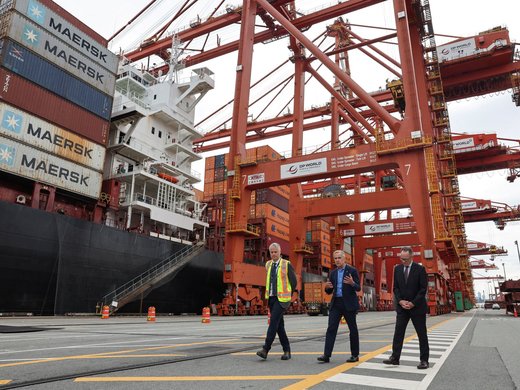So, it begins. President Donald Trump is now on record saying he wants to “speed up” the renegotiation of the North American Free Trade Agreement. Foreign Affairs Minister Chrystia Freeland, who will lead Canada’s engagement with the Trump administration, insisted on February 2 that it would be incorrect to say the clock has started. Freeland, a former journalist who would have been used to obfuscation in her old job, has become rather good at it in her new life as a cabinet minister. Don’t be fooled: it’s real; NAFTA is about to be overhauled.
The months ahead will feature a lot of what I call, “Little Canada.” By that I mean the impulse to narrow Canada’s world view to what goes on in the United States, which I mentioned in a piece on January 27. As if on cue, Evan Solomon documented unofficial Ottawa’s willingness to abandon Mexico if doing so would allow Canada to protect its “special” relationship with the United States. Solomon spoke to Derek Burney, the former Canadian ambassador to the U.S. who helped negotiate NAFTA. “The U.S. war of words with Mexico is dangerous, and Burney, among others, is convinced the first thing that Canada has to do is abandon the Three Amigos relationship,” Solomon wrote at Maclean’s on January 30. He quoted Burney as saying the following: “We should not indulge in ridiculous posturing—like getting together with Mexico to defend our interests, when Canada has very different economic interests than Mexico. It is a fundamental error to conflate them.”
Are the economic interests of Canada and Mexico really so different? Both are middle powers that depend on access to international markets because their populations are either too small (Canada) or too poor (Mexico) to consume all the goods and services they are capable of producing. Economic gravity pulls most of what they sell into the United States. But the post-War commitment to more-the-merrier trade agreements has created a system in which smaller countries can trade under rules that aren’t entirely skewed in favour of the two or three biggest players.
Much of what Trump has proposed to do on trade would violate the terms agreed at the World Trade Organization, but it is possible the new president may not care. Suing the U.S. at the WTO would take years, and Trump, who has called the Geneva-based trade watchdog a “disaster,” could follow through on his threat to quit it. “He may believe (possibly correctly) that the next day, trade ministers will be lining up in Washington to negotiate bilateral FTAs, ready to accept U.S. terms, thus handing him another victory,” Oonagh Fitzgerald, director of the international law program at the Centre for International Governance Innovation (CIGI), and Hector Torres, a member of the International Monetary Fund’s executive board, wrote in an op-ed on January 30. (Disclosure: I am a senior fellow at CIGI.)
Clearly, it would be a mistake for Canada to go out of its way to pick a fight with the White House. But Trudeau also is making a mistake by failing to contain talk that Canada’s interests are best served by becoming Trump’s patsy. Mexicans are “perplexed by some of the recent calls in Canada for ‘dumping’ Mexico from NAFTA and negotiating a bilateral deal with Washington,” Andrés Rozental, a former Mexican deputy foreign minister, wrote in the Globe and Mail on January 27. “This is both short-sighted and a mistake. If NAFTA is torn apart, Canadian investment and trade with Mexico will be adversely affected, as will the overall relationship.”
Here’s a graphic representation of why we should be concerned with what countries other than the U.S. think about us:
That’s a rough sketch of Canadian merchandise exports to some key trading partners since the end of the Great Recession. A few things stand out. The U.S. is as important as ever, but Canada’s trade with China has been growing considerably faster. At the same time, trade growth with both the U.S. and China may have a plateaued. I used monthly data to create the index, and Statistics Canada still hasn’t published figures for December. That means export growth to the U.S. and China hasn’t slowed as dramatically as the chart suggests. But I went with an incomplete set of figures to show something else: Canadian trade with Mexico is comfortably above trend even with the missing month of data. “Canada’s relationship with Mexico has blossomed,” Peter Hall, chief economist at Export Development Canada, said in a commentary on January 26.
Trump’s approach to diplomacy is an affront to almost everyone. Scott Gilmore of Maclean’s wonders if that means Canada has a unique opportunity to finally make the “north” in North America mean something to people in places like Milan, Mumbai and Mexico City. I wonder too. How closely do we really want to align ourselves with an international pariah, albeit a powerful one? Do we even need to be that afraid? Does a man who received almost 3 million fewer votes than his opponent in the election really have the political capital to carry on like this? Financial markets love him for now, but is he really capable of upending economic logic? As Hall noted, trade with Mexico supports some five million American jobs, many of them in Texas, a state where Republicans worry about losing their stranglehold.
Chief executives who initially appeared cowed by Trump, including Ford’s Mark Fields and Uber’s Travis Kalanick, now are standing up to him. Canada shouldn’t be fearful of doing the same. If Trudeau really believes in international trade, he should be willing to stand up for it. He would be serving Canada’s long-term interests by doing so.
This article originally appeared in Canadian Business.
.cbR{box-sizing:border-box;display:block;width:100%;margin:1em 0;border:1px solid #bbb;padding:.5em}@media (min-width:480px){.cbR{width:250px;margin:0 0 1em 1em;float:right}}


